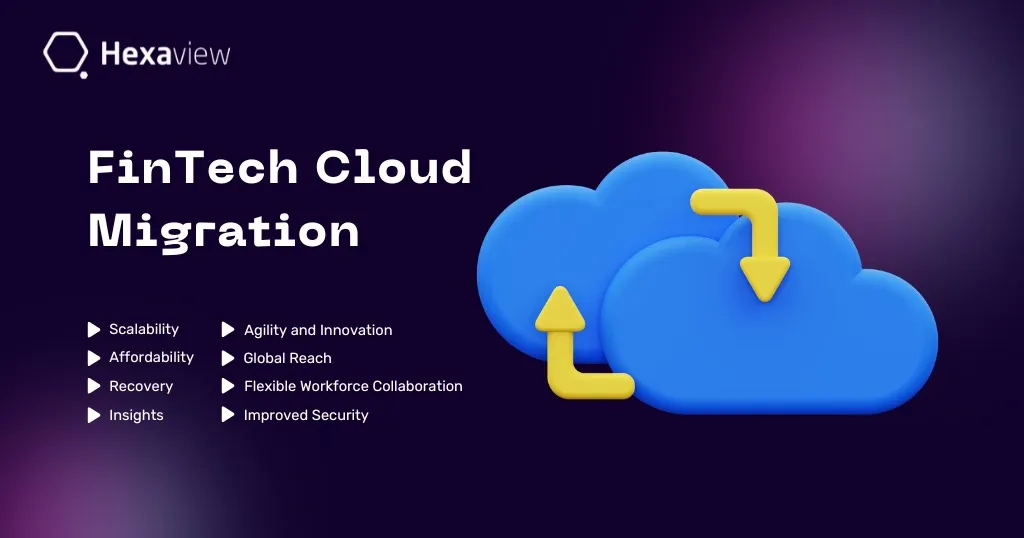FinTech cloud migration services are availed by a big number of organizations across the globe regardless of size owing to many reasons. This piece intends to familiarize its readers with the benefits of FinTech cloud migration services. So, read on!
FinTech Cloud Migration: An Overview
FinTech cloud migration is a process of moving data, applications, and other business elements from an on-premises server to its cloud-based counterpart. Clouds can be public, private, and hybrid. Fintech companies, driven by the need for digital transformation, are increasingly turning to cloud computing to modernize their infrastructure. This shift offers several advantages, including cost savings, improved scalability, enhanced security, and increased agility.
By leveraging the scalability, cost efficiency, security, and agility of cloud computing, fintech companies can unlock new opportunities for growth and differentiation in an increasingly competitive landscape. However, organizations must also navigate challenges such as data security, vendor lock-in, and regulatory compliance to realize the full potential of fintech cloud integration. Ultimately, successful fintech cloud integration requires a strategic approach, robust security measures, and proactive risk management to harness the full power of the cloud while mitigating potential risks and challenges.
FinTech Cloud Migration: Key Benefits
The primary benefits associated with cloud migration are listed below:
Scalability: Scalability is one of the most tempting benefits offered by cloud migration and many organizations consider it as a key reason for conducting the migration exercise. Fintech cloud migration enables companies to scale resources up or down instantly based on demand. Whether handling spikes in transaction volumes or expanding into new markets, cloud scalability ensures that fintech firms can efficiently allocate computing resources to meet business needs without overprovisioning hardware.
Affordability: Cloud computing follows a pay-as-you-go pricing model, allowing fintech companies to optimize costs by paying only for the resources they consume. This eliminates the need for upfront capital investments in hardware and infrastructure, while also reducing operational expenses associated with maintenance, upgrades, and energy consumption.
Improved Security: Leading cloud providers offer robust security measures, including encryption, multi-factor authentication, and advanced threat detection capabilities. By migrating to the cloud, fintech firms can strengthen their security posture, ensuring the confidentiality, integrity, and availability of sensitive financial data while also achieving compliance with industry regulations.
Agility and Innovation: Cloud-native technologies enable fintech organizations to innovate faster and deploy new features and services more rapidly. By leveraging cloud-based development tools, microservices architectures, and DevOps practices, companies can accelerate the software development lifecycle, iterate on products more quickly, and respond promptly to market opportunities and customer feedback.
Global Reach: Cloud migration facilitates geographical expansion and global scalability, allowing fintech firms to reach new markets and customers without the need for physical infrastructure investments. By leveraging the global footprint of cloud providers, companies can deliver services with low latency and high availability to customers worldwide, enabling seamless cross-border transactions and international growth.
Disaster Recovery and Business Continuity: Cloud computing offers built-in redundancy and disaster recovery capabilities, ensuring business continuity and data resilience in the event of hardware failures, natural disasters, or cyberattacks. By replicating data across multiple geographically dispersed data centers, fintech companies can minimize downtime and data loss, maintaining service availability and customer trust.
Flexible Workforce Collaboration: Cloud-based collaboration tools enable remote work and facilitate seamless collaboration among distributed teams, contractors, and partners. By migrating to the cloud, fintech organizations can empower employees to work from anywhere, streamline communication and collaboration, and foster a culture of innovation and agility.
Data Analytics and Insights: Cloud migration unlocks the power of big data analytics and machine learning, enabling fintech firms to derive actionable insights from vast amounts of financial data. By leveraging cloud-based analytics platforms and services, companies can gain a deeper understanding of customer behavior, detect fraudulent activities, optimize business processes, drive informed decision-making and have a competitive advantage.
Regulatory Compliance: Leading cloud providers offer compliance certifications and attestations, such as PCI DSS, SOC 2, and GDPR, demonstrating adherence to industry-specific regulations and standards. By migrating to compliant cloud environments, fintech organizations can simplify compliance management, reduce audit complexities, and demonstrate regulatory compliance to customers, partners, and regulators.
Elasticity and Resource Optimization
Cloud migration enables fintech companies to dynamically adjust computing resources in real-time to match workload demands, optimizing resource utilization and minimizing idle capacity. By leveraging auto-scaling, load balancing, and serverless computing services, organizations can achieve higher efficiency, performance, and cost savings, while also reducing time-to-market for new products and services.
Hexaview Technologies is a digital transformation organization engaged in offering FinTech cloud migration services to an impressively lengthy list of clients across the globe for over a decade now. Hexaview was recently involved in a cloud migration project to help a US-based fintech player involved in offering payment processing solutions to medium and enterprise-level firms. The client faced multiple challenges with its existing on-premises infrastructure. Scalability was limited, maintenance costs were high, and security vulnerabilities were also present in abundance.
After conducting a thorough assessment of the client’s existing infrastructure, applications, and data requirements, Hexaview developed a detailed cloud migration plan. The sequence of migration was outlined and the strategies pertaining to resource allocation and risk mitigation were formulated. After evaluating the capabilities of several cloud platforms like AWS, Google Cloud, and Azure, Hexaview recommended the use of AWS.
AWS was selected because of its extreme scalability and powerful security features. The migration process was executed in a phased manner to ensure the prevention of any disruption in operations. While migrating the databases, applications, and storage systems to AWS, data integrity and performance optimization were ensured. After successful migration, Hexaview integrated cloud-based services with the client’s existing systems to ensure seamless functionality and effortless data synchronization. Hexaview also provided detailed training sessions to the client’s staff to equip them with the skills and knowledge required to manage cloud-based infrastructure.
If you liked what you read, please feel free to browse our entire library of blogs. You can also follow us on all the social media platforms to keep yourself updated with all the developments, trends, and disruptions in the fintech sector.



%201.svg)
